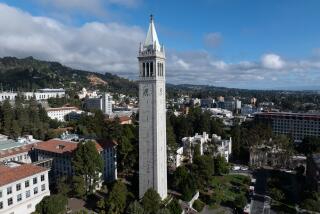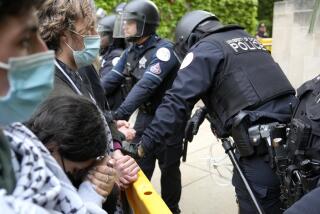Gulf Conflict Adds New Relevance to College Peace Studies Curriculum : Education: About 200 U.S. schools offer such programs. Participants say the recent fighting solidified their dedication to nonviolent solution.
HAMILTON, N.Y. — An Arab, a Jew and a Quaker are arguing about the Persian Gulf War.
That’s not an introduction to a bad ethnic joke. It’s part of a serious study of war and peace by college students committed to understanding violence--so they can end it.
Peter Barsoom is an Arab-American who supported U.S. military action to force Iraqi invaders from Kuwait. Dan Goldstein is a Jew who opposed the war. Michael Brown, who grew up as a Quaker, also opposed the war. The three argued the issue at Colgate University, where they are majoring in one of the nation’s oldest peace studies programs.
“A lot of the reason the war came about is because people in this country let it happen by not being aware of our policies in the Middle East,” says Goldstein, 21, of Eastchester, N.Y.
Barsoom countered that U.S. ignorance can’t be blamed for a war started by Iraqi leader Saddam Hussein.
“It was naked, brutal aggression, a calculated move on his part,” says Barsoom, 20, of East Brunswick, N.J.
Brown, 21, of Chapel Hill, N.C., takes the middle ground, saying “it was a little of both”--Hussein’s aggression and the U.S. policy of policing the world--that led to war.
Campus war dialogue has become a gentler art than the violent college clashes during the Vietnam War. Among war opponents, the urgency to stop the violence is still there. But now it is channeled to a great degree into an academic discipline that sprang up mainly because of campus unrest two decades ago.
The first peace studies program was started in 1948 at Manchester College in Indiana. But it was the Vietnam-era anti-war movement that prompted the widespread creation of peace studies programs, including Colgate’s in 1970.
Other universities quickly followed, including Kent State in Ohio, prompted by the killings of four anti-war students by national guardsmen, and Syracuse University in New York, prompted by a demand by striking students.
A second wave of colleges began peace studies programs in the early Ronald Reagan years, when U.S.-Soviet relations were ebbing.
About 200 U.S. colleges now offer peace studies.
Many students and faculty members say the fighting in the Persian Gulf made war a more shocking reality for them and solidified their commitment to nonviolent resolution of conflicts.
“I’m against war on principle,” says Michela Bowman, 19, of Northampton, Mass., a peace studies major at Colgate. “I see Iraq’s invasion of Kuwait as a signal that there are Mideast problems and issues that need to be dealt with directly. Bombing people won’t deal with them.”
“I don’t like the idea of the United States as a police power whenever there’s a problem in the world,” says classmate Polly Peterson, 19, of Chatham, Mass.
Peace studies can help “provide nonviolent solutions to what otherwise seem intractable situations,” says Louis Kriesberger, a professor in Syracuse University’s program.
Some scholars disagree, viewing peace studies as an overly optimistic discipline that fails to consider the subtleties of international relations. Such programs often are little more than lessons in consciousness-raising, says George Quester, a political scientist at the University of Maryland.
Quester, who once headed Cornell University’s peace studies program, says that “if you show people how bad war is and emphasize that in the curriculum and seminars, then that’s addressing the problem.”
But, he adds, such programs offer little advice on how to actually prevent war.
Peace studies classes have been swamped by students since the Gulf crisis began in August, 1990. At Colgate, classes that had 30 students a year ago have 40 or more now, says Nigel Young, the program’s director. At Kent State, enrollment in peace studies classes has risen as much as 40% since the Kuwait invasion, says Karen Cunningham, who teaches in the program.
“With anything that’s not at the forefront of our minds, an apathy appears until another crisis occurs,” Cunningham says.
Peace studies students take jobs where they can work toward peaceful resolution of conflict. Many get jobs with the State Department or with churches, or become journalists, lawyers and teachers.
One peace studies graduate from Colgate works for the U.S. Embassy in London. Another joined the Marines. One present Colgate peace studies major wants to work for Greenpeace, the environmentalist group.
Some universities, such as Colgate, offer undergraduate degrees in peace studies. A few schools, including UC Berkeley, have graduate peace studies programs. But most schools offer only minor concentrations in the subject.
Most peace studies programs start with a core of courses with names such as “Movements for Peace and Social Change” or “War, State and Society.” Peace studies cut across nearly every academic discipline, borrowing from international relations, political science, philosophy, economics and other subjects.
Leading practitioners of nonviolent change often are invited to lecture. Guest lecturers at Colgate have included Nobel Peace Prize winner Mairead Corrigan, who has worked to end violence in Northern Ireland, and Danilo Dolci, who has fought to end Mafia violence in Italy.
Students study such matters as modern anarchism, the writings of Thoreau, Gandhi and other philosophers of nonviolent protest, the civil rights movement in the ‘60s, draft resisters during the Vietnam War, unions and strikes, the psychology of human aggression, nuclear weapons protesters, and the women’s rights movement.
They also study war, from the American Revolution, the Civil War and Vietnam to the Franco-Prussian War, the Sino-Japanese War and the Battle of Algiers.
A student at Earlham College in Richmond, Ind., has been studying Virgil’s “Aeneid,” comparing the aftermath of the Trojan War to the Persian Gulf situation, says Tony Bing, director of the school’s peace studies program.
Eighty percent of the 1,200 students at Earlham College, a Quaker school, take at least one peace studies course, Bing says.
Despite their dovish stance, peace studies teachers and students say the Persian Gulf War has perversely benefited their programs. The Vietnam War or World War II may be nearer in history than the Peloponnesian War or the Crusades, yet students view those modern wars as events dead and gone.
“There’s a false expectation that those are things from history, that those are things that can’t happen now,” says Maire Dugan, director of the Consortium on Peace Research, Education and Development in Washington, D.C. “That’s changed with the presence of a war, and a war that’s threatening to them because of their age, because they might be drafted into it.”
With the war over, peace studies scholars will examine how they can apply its lessons in future classes. Just as Vietnam laid the foundation for the advent of peace studies, the Gulf War may provide the groundwork for lasting peace, they say.
“Hopefully, we’re putting structures in place now so the next time we can stop it before it happens,” said Colgate’s Bowman.
More to Read
Sign up for Essential California
The most important California stories and recommendations in your inbox every morning.
You may occasionally receive promotional content from the Los Angeles Times.










